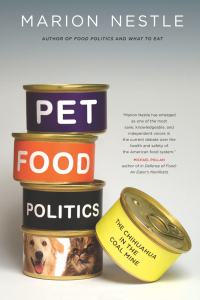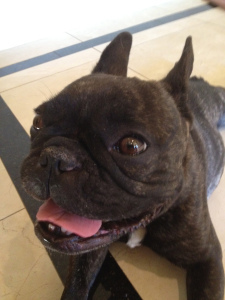March 31, 2012: They're killing your pet. And you could be next!
I've been reading Marion Nestle's Pet Food Politics, a book that details the mass 2007 tainted pet food recall and its far-reaching implications. For those of you who don't know, back in 2007, cats and dogs started dying under mysterious circumstances. Panicked pet owners contacted the FDA which, in turn, contacted pet food companies. Ensuing tests discovered the presence of melamine (used as a fire retardant, fertilizer, and in industrial plastics) and cyanuric acid (a chlorine stabilizer) in their products, two chemicals that, when combined, can result in kidney failure. Further investigation revealed that their presence in the pet food was clearly not an oversight or mistake on the part of Chinese suppliers. Melamine and cyanuric acid, it turns out, are added to animal feed by unscrupulous suppliers because they make the feed appear as though it contains high amounts of protein. In the case of the pet food ingredient coming in from China, wheat gluten was the culprit.
The book offers a fascinating and incredibly troubling overview of the scandal, the fall-out, and the possibility that it could happen again because there are no proper safeguards in place to protect our pets – and, apparently, the human food supply. Among the surprising revelations in Nestle's book is the fact that some of that tainted wheat gluten found its way into animal feed – chickens, pigs, and fish destined for dinner tables.
It may also interest you to know…
- Menu Foods, the company at the heart of the largest pet food recall in history (60 millions cans), manufactured pet food for 17 of the top 20 North American retailers. From cheap Walmart brands to high-end premium labels like Iams and Eukanuba, "they were all lumped together in one recall, all made at exactly the same place, all with virtually identical ingredients, and all made by one manufacturer." (Pet Food Politics, Marion Nestle – P. 14). Menu Foods is criticized for waiting so long to issue a recall (about a month after the first reported cat deaths) and there is the implication that they would have waited even longer had their best customer, Proctor & Gamble, not forced their hand. Menu Foods was bought out by Simmons Pet Food in August 2010.
- Menu Foods had bought the contaminated wheat gluten from a company called ChemNutra, a Nevada-based importer of food, animal feed, and pharmaceuticals that has described itself as "The China-Source Experts". The wheat gluten it sold to Menu Foods had come from a Chinese manufacturer, Xuzhou Anying Biologic Technology Development, that denied any knowledge of how the melamine got into the food and even denied shipping wheat gluten to the U.S. However, a truck driver interviewed by a New York Times reporter revealed the company had a factory that made wheat gluten, a factory that was, suspiciously, shut down since the scandal broke. There are suggestions the company ran a shipping scam, exporting the wheat gluten through another company (Suzhou Textiles Silk Light Industrial Products Arts and Crafts Import and Export Company) to bypass Chinese food inspection.
- The Chinese government shut down the companies associated with the scandal and detained its managers. Neither, it seems, faced any criminal prosecution. Zheng Xiaoyu, the former head of the state food and drug administration didn't fare as well. He was accused of accepting $800 000 in bribes for drug approvals and subsequently executed.
- From 2006 to 2007, China was the largest supplier of food additives to the U.S. More than 50% of U.S. apple imports originated from China, 21% of seafood imports, and 24% of animal food products.
- The FDA is surprisingly ineffectual. It doesn't have the power to issue recalls of harmful foods, only suggest voluntary recalls. They are underfunded, receiving 20% of budgetary support to the USDA's 80% (even though the FDA is responsible for monitoring the safety of 80% of the food supply as opposed to the USDA's 20%). They are also undermanned. In 2007, they were able to inspect only about 1% of the 25 000 daily food imports. Of the 20 000 food products that came in from China in 2006, they were only able to inspect roughly 2%. (Pet Food Politics by Marion Nestle – PP. 146-147).
- The Canadian Food Inspection Agency is even less inclined to get involved in matters relating to the health and safety of our pets. According to a spokesperson for the CFIA, Canada doesn't regulate pet food because "We're the Canadian Food Inspection Agency. We deal with food – and food is for humans." (Pet Food Politics by Marion Nestle – P. 158).
Which brings us to this week when I noticed Jelly was feeling under the weather, vomiting and drinking excessive amounts of water. I brought her to the vet who checked her out and sent her home with some meds. She was on the road to recovery when Bubba fell ill, exhibiting the same symptoms. Was it mere coincidence that we had picked up a bunch of new treats for them earlier in the week?
According to the labels I checked, the products were made in North America – but that's small solace given that there's a difference between being made in North America with North America ingredients and being made in North America with ingredients from China, a distinction that is lost on some companies. Add to this the fact that a couple of the pet food companies caught up in the recalls claimed to have no knowledge that some of their ingredients were sourced from China, and I'm erring on the side of caution. The treats went into the trash. At which point I turned my attention to the dog food I've been buying – Royal Canin and Hills both of which, it turns out, were part of the mass recall back in 2007. Yesterday, I contacted both companies and asked them whether the ingredients in any of their products originate from China. I've yet to hear back but will report their responses when I do.
While I was doing a little online research for this entry, I learned of another ongoing pet food issue. Dogs are getting sick (600 reported cases including my sister's husky, Aspen) and all fingers point to chicken jerky treats from China, but no recall has been issued because, according to the FDA, "a definitive cause has not been determined". Still, that hasn't stopped the FDA from linking three products to the recent problems: Waggin' Train Chicken Jerky, Canyon Creek Ranch Chicken Jerky and Milo's Kitchen Home-Style Dog Treats, the first two made by the Nestle Purina Pet Care Company and the latter made by the Del Monte Corporation.
Back in July 2011, when first approached about the possibility that it's product may be making dogs sick, Waggin' Train responded: "…In 2007, the U. S. Food and Drug Administration (FDA) issued a notice regarding dog illnesses, but was unable to determine a definitive cause of the illnesses or a direct link to chicken jerky products. To date, extensive testing performed by the FDA has not uncovered a contaminant or specific ingredient as the cause of any illness, including in Waggin' Train treats. It is widely accepted that any association between dog illnesses and chicken jerky is likely the result of dogs (primarily small dogs) consuming treats in excess of normal or recommended levels. Chicken jerky products should not be substituted for a balanced diet and are intended to be used occasionally, in small quantities. Consumers should read and follow the feeding guidelines found on Waggin' Train packages." In other words: "It's not OUR fault. It's YOUR fault."
Doubt it.
The attitude of the FDA, the CFIA, the government, and these pet food companies is maddening. They say they care about the health of our pets but actions speak louder than words. I don't trust any of them. And, after reading Pet Food Politics, you may have reservations as well – when it comes to not only pet food safety, but the safety of the food you eat as well.
So, what can be done? Well, you can start by getting involved, making some noise, writing your government and these pet food manufacturers to let them know you're worried and want to know what they're doing to address your concerns.
Educate yourself on your food sources. Buy local as much as possible for both yourself and your pet.
And, if you can, start cooking for your pet. Today, I'm picking up some chicken, beef, and veggies for the gang. Will they be safer? Probably? Will they be happier? Definitely.
Tagged: chicken jerky treats, chicken jerky treats from China, Dogs, Marion Nestle, melamine, Menu Foods, Pet Food Politics, pet food recall

Joseph Mallozzi's Blog
- Joseph Mallozzi's profile
- 39 followers





